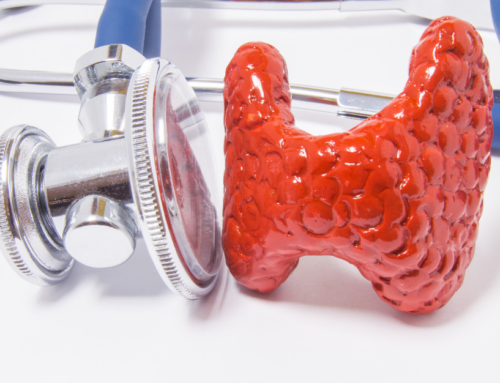Amazing lady, how are you feeling right now? Not so amazing? Are you so tired and worn out that you can’t remember the last time you had a spring in your step? Have you noticed more hair in your brush and less on your head? Are extra pounds sticking to you like magnets?
These aren’t normal signs of aging!
I see women in my clinic every day with these same symptoms and many others, and in almost all cases one of the main culprits is the thyroid. This small, unobtrusive gland plays a BIG role in how your body works, and consequentially how you feel. If you feel like a car that hasn’t gotten an oil change in a year, then it is likely that your thyroid isn’t functioning properly. Let’s shine the spotlight on this shy gland so you can understand what the thyroid is, what it does, and what happens when it doesn’t want to play ball.
What is the Thyroid?
If you put your fingers on the front of your throat and feel for the area where a man’s Adam apple would be, your fingers will be just above the thyroid gland. This hormonal gland is shaped like a butterfly. Though it is small, it pumps three powerful hormones into the body:
- Triiodothyronine (T3)
- Tetraiodothyronine (T4)
- Calcitonin
What Does the Thyroid Do?
For such a small organ, the thyroid does a lot. The hormones it releases help regulate your metabolism, which plays a big role in how all of your organs function. Your thyroid directly affects your heart, brain, liver, and your ability to burn fat.
When the thyroid starts to malfunction, bad things happen!
Underactive Thyroid
When your thyroid is working normally, you will feel energetic and clear-minded. Everything in your body will be humming along in perfect harmony. If your thyroid starts to slow down, releasing less and less T3 and T4, you’ll start noticing a wide variety of symptoms. For instance, as your metabolism slows, you’ll feel tired and lethargic and notice that the pounds sneak up on you. You may also notice:
- Thinning hair
- Brain fog
- Loss of sexual desire
- Dry skin
- Feeling cold
- Depression
It is very common for women with an underactive thyroid to assume their symptoms are a normal part of aging or to be told by their friends and family members that they are overreacting. Not so!
You Could Have an Auto-Immune Disorder
In the majority of cases, hypothyroidism is caused by an autoimmune disorder, known as Hashimoto’s. What this means is simply that your own immune system is mistaking your thyroid for an enemy. When the immune system is triggered, it attacks the thyroid, causing more and more damage over time, which results in less thyroid hormones in your body. That means your symptoms will only become more pronounced the longer you try to ignore them.
Unfortunately, we ladies are six times more likely than our male counterparts to develop autoimmune hypothyroidism, and it is most common of all in menopausal and post-menopausal women.
Do not despair! Now that you know what may be causing your symptoms, stay tuned to this blog to learn how to discover if you have Hashimoto’s and how to manage your symptoms without swallowing pills for the rest of your life. You can also check out my book, Thyroid and Menopause Madness wherein I lay out everything I’ve learned about testing for Hashimoto’s and autoimmune diseases and how to manage symptoms and restore health!





